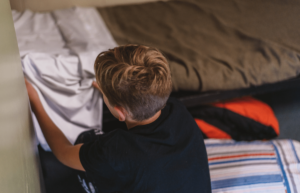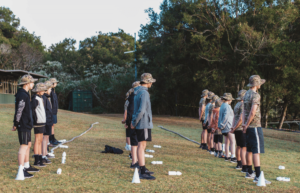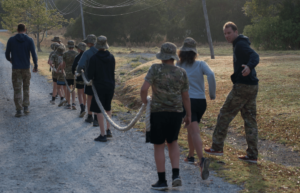
06 Jul How to beat the winter blues in teens
At Veteran Mentors, one of the most common questions we get from parents is about how to help their teen beat the winter blues. Parents are typically the first to notice that the change in weather and shorter days are having an impact on their teen’s mental health.
If you feel at all concerned about this change in mood, then we recommend seeking out professional help to support you and your teen through this period. It’s important to get the right health advice that’s specific to your teen and their situation. You can also make time to chat with your teen about the importance of mental health on their overall wellbeing.
Can You Even Beat The Winter Blues?
The ‘winter blues’ can also be termed SAD, or Seasonal Affective Disorder. This is a more significant and diagnosable condition your teen may also be impacted by. Those affected by the winter blues often feel the need to sleep more, can become quickly irritable, struggle with a lack of energy, and don’t feel like socializing. All of these can lead to a nasty negative spiral that will make home life with your teen much harder!
Teenage bodies are more susceptible to mood fluctuations from the winter blues than adults, as their hormones are already changing and shifting. This applies equally to both young men and women and can have a significant impact on their home life, interpersonal relationships, school grades, and general interest in doing activities they would otherwise enjoy.
There is a range of ways we encourage parents and teens to approach the winter months, to help them avoid the worst effects of SAD or the winter blues. Here are our most common recommendations on how to beat the winter blues for teens.

1 – Keep A Routine
The worst thing teens can do during the winter months is start to make changes to their regular routine. Even though the days are shorter (and colder), we highly recommend you don’t make big changes to your routine.
The human body is wired for routine and prefers to release the same hormonal chemicals at the same time each day. Cortisol is naturally higher in the morning and contributes to our feeling of wakefulness. Similarly, melatonin is naturally higher in the evening and leaves us with a sense of feeling sleepy (you know the feeling when your eyelids start to droop).
Make sure you set an alarm in the mornings and go to bed around the same time each evening. The more you can reinforce these patterns (even when nature makes it harder!) the better you’ll be able to ward off the winter blues.

2 – Get More Light Exposure
Following on from point 1, the rhythms of the natural world in winter tend to work against us since daybreak is later and sunset is earlier. Our bodies (particularly our eyes and skin) have a range of receptors that tell us when it’s time to get up and when it’s time to go to bed. The reason we feel sleepier in winter is that these are naturally triggered out of sync with our usual routine.
The way we can work around this is to make sure to turn on plenty of lights in the morning when we wake up, and also to leave them on later in the evening until we’re getting ready for bed. Getting outside into fresh air as soon as possible is also a great way to kickstart your body clock. The colour of the light also matters; warmer hues in lights trick our bodies into thinking we’re being exposed to sunlight, so try to avoid having cooler white lights or fluorescent bulbs in your home if possible.

3 – Put Your Phone Away
This is a point we continue to drive home at Veteran Mentors. Modern mobile phones have a range of amazing uses, but when poorly used they can make the winter blues even worse in teens. Mobile phone screens emit very strong blue light that signals our body to keep producing ‘awake’ hormones, so when teens sit up on their phones late into the night it has a compounding effect.
Modern phones also keep teens ‘wired’ into the modern world, and strong stimulation late in the evening is guaranteed to lead to poor sleep and reinforce a bad routine. The answer is simple; have an open conversation with your teen about phone use in the evenings and set a hard cutoff time for them to turn their phone off.

4 – Keep Socializing
Some parents tell us that their teen often retreats during the winter months and is less engaged in social activities. Unfortunately, this is the time when they should be getting out and about the most to ward off feelings of depression and isolation. As a parent, you may need to look for opportunities to spend more time with your teen or have them invite their friends over for an activity or outing.
Humans are social animals and teens are no different. While phones and modern social media allow for a level of connectedness, it’s no replacement for face-to-face interaction. Keeping up a social schedule is an important element in beating the winter blues, especially for teens. If your teen is more reclusive but still has a range of hobbies, find adult groups for them to attend and go along with them.

5 – Move Your Body
There’s no way to get around the need for exercise- in fact, it’s one of the best things your teen can do. Similar to good routines, light exposure patterns, and socializing the evidence is clear that exercise and movement is guaranteed to release a flood of positive endorphins and energy for your teen. Scientists the world over agree that even a moderate amount of exercise can have positive effects on our mental health.
If your teen is sporty this shouldn’t be too hard; there are a range of sports they can play all through the winter months. For teens who are less inclined to physical activity, look for ways to make exercise fun and dial back the intensity. They may also respond to less traditional sports, which is fine; this is all about individual preference. Getting out into nature is one of our favourite ways to help teens make movement a normal part of their routine.
Need Support to Beat The Winter Blues?
We trust these handy hints will help your teen beat the winter blues this year. If you have any other helpful tips or questions then don’t hesitate to reach out to the team at Veteran Mentors.



Sorry, the comment form is closed at this time.